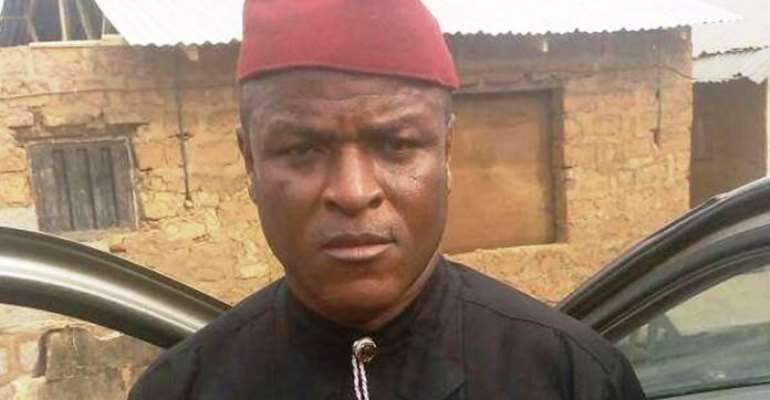Tony Ezimakor: The DSS Detention Of Independent Journalist

By holding the Abuja Bureau Chief of INDEPENDENT Newspapers, Tony Ezimakor, in its custody for clear six days, the Department of State Services (DSS) unfortunately may have inadvertently signposted the displeasure of the administration for a free press. This is sad, coming at a time that the country is trying to get a firmer footing on democracy.
In this age and era, the acts of using security agencies to harass, intimidate and cajole the mass media from performing their constitutionally recognised role of being the watchdog of the society is unconscionable. Besides, such acts negate the complimentary nature of the press to government, in developing the country. President Muhammadu Buhari should prevail on the DSS and other over-enthusiastic security agencies from acting in a manner detrimental to democracy.
Ezimakor was arrested last week Wednesday when he reported to the Abuja headquarters of the DSS, in honour of an invitation to Independent Newspaper. He was held in captivity since then and only released on Tuesday night. All through the period, DSS did not formally disclose his offence or that of the newspaper he represented.
His detention was however believed to be in connection with the newspaper’s story of February 21, 2018, on the payment of about $2 million ransom to Boko Haram insurgents for the release of 82 abducted girl-pupils in a government secondary school in Chibok, Borno State. The story hinted on how the negotiations had apparently been turned into a commercial venture, perhaps to the detriment of the nation.
Understandably the detention had attracted wide condemnations from groups and individuals across the country and the world, as an official attempt to muzzle the press. Ezimakor had reportedly been pressurised to disclose his source of information on the news story. Those who criticised the DSS action include the Nigerian Union of Journalists, lawyers, human rights organisations, civil society groups and several concerned citizens.
In addition to detaining the journalist, the DSS had on Friday also raided Ezimakor’s residence in Abuja, taking away his laptop, personal and official documents as well as other belongings. The thrust of the reactions on the agency’s action was that the detention was unconstitutional, a violation of Ezimakor’s fundamental rights and an unsavory attempt to repress the media from carrying out their constitutional duties.
We appreciate the concern of all groups and individuals whose protest over the incident eventually led to Ezimakor’s release. Granted that the performance of journalistic duties can sometimes run into conflict with the operation of national security mechanism, arresting and detaining journalists arbitrarily and in disregard of due process cannot be an accepted way to reconcile the conflict.
Section 39 of the 1999 Constitution as amended provides that “every person shall be entitled to freedom of expression, including freedom to hold opinions and to receive and impart ideas and information without interference.” Under section 22 of the same Constitution, the media has a duty, as the fourth estate of the realm, to make public officials accountable to the people.
These rights are fundamental and should not be flouted lightly. Rather, in furtherance of the democratic system embraced by the government, security agencies or other government agencies should endeavour to state government positions in correction of any perceived error by the news media. In that way, the public is carried along and made to understand the issues at stake.
Government or its agencies should not be too quick to perceive newspapers as working in its opposition, more so as the report in question borders on anti-corruption and public accountability, which are cardinal objectives of the administration. Besides, the Boko Haram insurgency, which is the core issue in the story, is a recurring decimal that has claimed thousands of Nigerian lives and thus become a matter of grave public interest. Any effort, including by newspapers, to unravel and bring it to an end should be appreciated by security agencies.
Government should learn lessons, including the need to respect constitutional provisions relating to liberty of persons particularly when that person is discharging his professional duties as permitted under the constitution and extant laws of the country, as in the case of Tony Ezimakor. In the long run, government or its security agencies stand to gain by courting the media for information that could help to resolve problems of national security such as Boko Haram.
As a last resort, the DSS has the option of seeking legal advice from appropriate quarters to determine if an erring writer has committed an offence known to law; and if he can be appropriately charged to court. But to keep such person in custody with the hope of extracting from him, information obtained by him in confidence is improper and contrary to section 35(2) of the 1999 Constitution.
There is therefore need for the DSS leadership to update its personnel on performing security operations without contravening fundamental constitutional provisions. It is imperative, in the interest of democracy and good governance, for the DSS not to allow a repetition of the INDEPENDENT incident, either with the newspaper or any other medium of communication in the country. This is the norm in all civilised communities globally.
-Daily Independent-
